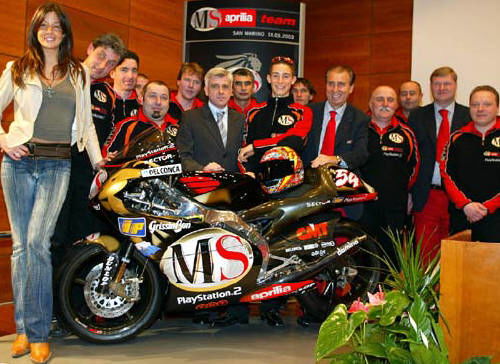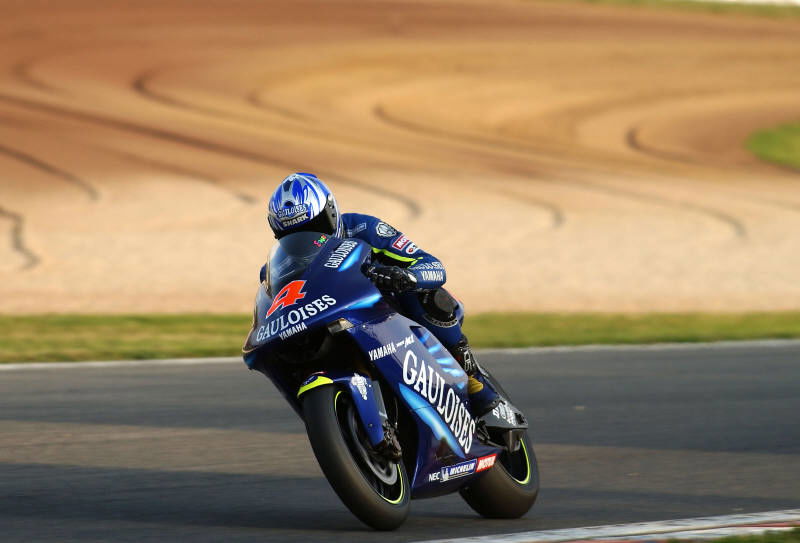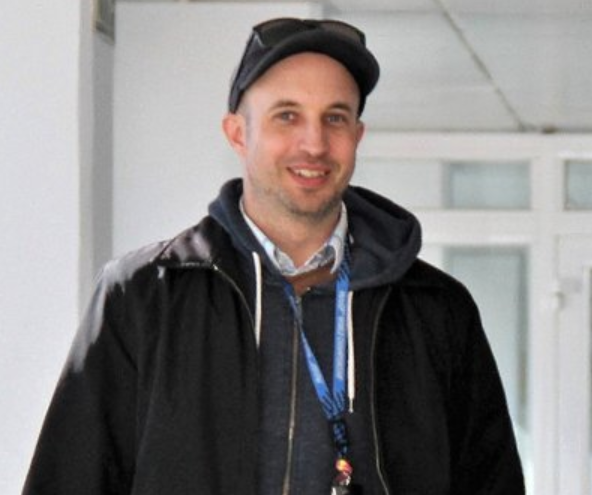Q&A: Chaz Davies.
Chaz Davies became the youngest ever full time grand prix entrant in 2002, at just 15 years old, when - helped by Alberto Puig and Dorna - he signed for the CWF-Matteoni Aprilia team.
Despite underpowered machinery and 'communication' problems with his Italian team, Davies emerged from the 16-race season with a reputation for intelligent, consistent racing - indeed mistakes were very rare and his 11th placed finish at Estoril made him the youngest British rider ever to score GP points.

Chaz Davies became the youngest ever full time grand prix entrant in 2002, at just 15 years old, when - helped by Alberto Puig and Dorna - he signed for the CWF-Matteoni Aprilia team.
Despite underpowered machinery and 'communication' problems with his Italian team, Davies emerged from the 16-race season with a reputation for intelligent, consistent racing - indeed mistakes were very rare and his 11th placed finish at Estoril made him the youngest British rider ever to score GP points.
Such efforts saw him featured in the December 29, 2002, edition of The Times Magazine, under its 'Next Big Thing' feature and much more importantly enabled the Herefordshire schoolboy to secure a ride with the proven Aprilia Germany team, in the 250cc class, for 2003.
Here, Chaz talks exclusively to Crash.net about the highs and lows of his rookie season, gives an insight into racing a GP bike, and reveals exactly what he admires about Valentino Rossi, Daijiro Kato and Colin Edwards...
Q: For those who hadn't heard of you before last season, can you give a brief description of your career so far?
Chaz Davies: I started mini biking at seven and a half years old, did a few meetings that year, then entered the British Mini Moto Championship properly the following year (1996). From '96 to '98 I won the Junior British Championship (for 7-12 year olds) and in 1998 I also won the "Paul Godward" Industrial class and competed in four Junior Road Race meetings, riding a Honda MBX 80cc, finishing 1st in class at all four meetings.
In 1999 I wanted to enter the Aprilia 125cc Superteen championship, but I was only 12 years old at the time and the Championship was open to riders aged 13-21. Due to my age, I was given the opportunity to prove myself in front of a handful of "experts" on a "Superteen" bike and they gave me - and two others - 'special dispensation' to enter the championship.
By the end of the year, I was the only rider to complete every race in a points scoring position, finishing the season in 6th overall and winning "Superteen of the Year 1999".
In 2000 I again entered the "Aprilia 125cc Championship" and finished 2nd overall, setting lap records at Oulton Park, Brands Hatch and Thruxton. I was also given 'special dispensation' again - to compete in the some of the British 125cc GP rounds.
In November 2000, Dorna were trying to find riders from countries that were not well represented in the World 125cc class. As a result, I was asked to go to Spain and test amongst many different nationalities and from this Dorna picked 8 riders - including myself - and formed a team backed by Telefonica Movistar and managed by Alberto Puig. That team competed at every round of the Spanish Championship in 2001 and my best result was 7th at Jarama.
When I wasn't racing in Spain I also competed in the British 125cc Championship and became the youngest ever winner of a British Championship race in August at Thruxton at 14 years and 5 months old.
At the end of that year Alberto Puig put mine and Casey Stoners name forward to Dorna as showing the best promise from the Spanish based team and Dorna placed me in Team Matteoni for the 2002 125cc GP season.
Q: Looking back on your first year of GP racing, what parts - on or off track - of being a Grand Prix rider were the most difficult to adapt to and which were easier than expected?
Chaz Davies: After my first test in 2002 one thing that surprised me and was easier than I had expected was the riders were not as fast as I had presumed. I had watched the riders on the television for years and presumed they were unbelievably fast but after riding with them for the first time and picking up the way they ride in Grand Prix, I found that although they were fast they also did things differently which made a big difference.
I found it easier than I expected to adapt to the way the 125cc should be ridden at Grand Prix level and eventually the only place where they were very fast was in a straight line. The most difficult thing to adapt to over the year was trying to get my Italian team to understand me!
Q: What were the high and low points of the 2002 season for you?
Chaz Davies: The high point was the British Grand Prix. Although I finished just outside the points [in 16th] I felt that I was riding very well and it was only bike problems that had slowed me down.
The low point was the crash I had in Brno [Czech Republic Grand Prix]. The handlebar snapped off at the end of the longest straight and I had no control over the bike, so I had to lay it down in the gravel at 115mph. I think the bike cartwheeled and hit me, which meant I had to be airlifted to hospital with internal injuries.
Q: Why did you decide to make the move from 125s to 250s for this season?
Chaz Davies: I made the move from 125cc to 250cc this year for two reasons. Firstly I was outgrowing the 125cc and did not feel comfortable on the bike towards the end of 2002 and secondly I felt I had a better chance of being competitive on a 250cc as in the 125cc class if you are not riding a factory or a very well kitted bike it is very difficult to get anywhere. With the 250cc it is much closer.
Q: Finding sponsorship for Motorsport in Britain is notoriously difficult. Can you give Crash.net viewers an idea of just how hard it is to raise money to go racing?
Chaz Davies: The only way to say how hard it is to find sponsorship in the UK is that I have a draw at home which has about 300 sponsorship rejection letters inside! If anyone is interested in sponsoring me personally or the team it would be greatly appreciated!
[Anyone interested in sponsoring Chaz can contact Crash.net through the homepage, where their details will be passed on].
Q: Can you tell us a bit about your new team?
Chaz Davies: My new team, Aprilia Germany, have run a Grand Prix outfit since 1987. My team boss, Dieter Stappert, has been involved in motorsport in one way or another for about 35 years.
Every member of the team is highly experienced in GP racing and some of the riders who have ridden in the past for Aprilia Germany include Reinhold Roth, Jeremy McWilliams, Ralf Waldman and Klaus Nohles. My teammate is Dirk Heidolf and the team are based about 25km South West of Munich. The team have been running Aprilias since 1998.
All of my mechanics ride bikes themselves, at club level, in Germany for fun so they understand what I mean when I give them feedback and also my telemetry man is Klaus Nohles - an ex-GP rider - and it's really good for me to have somebody like him who can understand exactly what I mean when we discuss set-up. The whole team are really good fun too.
Q: How did the recent IRTA tests at Jerez and Estoril go?
Chaz Davies: Testing so far this year has been very good generally. I adapted to the 250cc fairly quickly [pictured] and felt comfortable from the start with the team and the bike.
My team told me to take it easy on the first day as I need to learn, but I found the 250cc such an exciting bike to ride that I wanted to go fast from the start. I also enjoyed being able to wheelie a bike on pure acceleration with no effort!
At my second test in Jerez I caught the flu on the first day, which left me with a headache and feeling dizzy. I felt ok on the bike but I crashed quite heavily at the end of the first day - dislocating my wrist. We put the crash down to the track temperature having dropped about 6 degrees.
The last two days at Jerez I felt even worse and went to visit Dr Costas' Clinica Mobile - they said I had a fever and advised me not to ride. I took their advice as I wanted to be healthy for the next test five days later in Estoril.
I did feel better in Estoril, but I was still not 100%. On the first day the conditions were very bad - wet and windy and I didn't do many laps, but the second day was better and I managed to do a fair amount of laps, getting a reasonable set-up and doing fairly pleasing times. However, my wrist injury was holding me back on the heavy braking left hand corners.
Q: What are your goals for this season?
Chaz Davies: My goals for this season are to finish every race inside the points and - at the circuits I know I can go well at - I expect to finish in the top 10. Hopefully at the end of the championship I am aiming to finish in the top 12.
Q: Watching on TV - or at a circuit - it's often difficult to understand exactly what riders are doing during practice, apart from learning the track. Can you describe the process you go through in free practice?
Chaz Davies: I usually spend free-practice trying to get the suspension set-up and testing different solutions to any problems that I might have, or my mechanics might want me to test a set-up which they think may work for the specific circuit to try and gain time.
The problem I had last year was that the 125cc machines were out on track at 9.00am when the track temperature was normally fairly cold. I could usually get a good set-up in the morning but in the afternoon, when it was hotter, I had lots of suspension chattering problems.
The 250cc class go out after the 125s and MotoGP bikes so that shouldn't be such a problem this year. I will see in Suzuka!
Q: Apart from the increase in power, what are the main differences you noticed between a 125 and 250cc GP machine? Have you had to adapt your riding style as a result?
Chaz Davies: The main difference is that I can get more feeling with the 250cc chassis wise. The 125 felt numb compared to the 250. I find it more noticeable on the 250 when I change the suspension setting maybe just one click, whereas on the 125 I could not feel the changes as much.
I have also had to change my lines for the 250cc. Because of the power increase I have had to ride around the corner more and then stand the bike up and accelerate, whereas on the 125 the corners were made shorter because it was so important to get the drive out while still on the side of the tyre.
Q: As one of the Britain's most promising up-and-coming racers, what do you think has given you an advantage over your rivals and helped you reach World Championship level?
Chaz Davies: I think that the reason I got to GPs earlier than some others I raced with in 2001 was because I made the most of the opportunity to race in the Spanish championship. I did ok that year and also Great Britain is in need of Grand Prix riders so I am fairly lucky in that way.
Riding wise my strong points have always been braking and corner speed, which comes from my mini bike days. In the British and Spanish championship they were my strong points and I could outbrake most people, but when I came to Grand Prix I found it was a lot more difficult!
Q: For those Crash.net viewers who own road bikes. Can you give them an idea of the difference between riding a typical four-stroke road bike and your Grand Prix two-stroke?
Chaz Davies: The main difference between the four-stroke road bikes and two stroke GP bikes is that the two-strokes are a lot more angry and vicious when you first get on the power.
I spoke to Colin Edwards at my first test in Jerez in January about the difference between his Honda Superbike last year and the Aprilia GP bike he is riding now and he said that the Aprilia is an "animal" and he thought his SP-2 was fast - until he got on the Aprilia.
On the 250cc I found I had to be a lot more cautious when I first got on the power compared with the 125cc. Also the handling of a Grand Prix bike is razor sharp with a stiff chassis, which is very different to a road bike.
Q: As a racer, which fellow riders do you admire - and why?
Chaz Davies: The rider I have looked up to over the years is Valentino Rossi because of his dominance and how he adapts to different bikes so quickly. He is also a genuinely nice guy.
When Daijiro Kato rode in 250s I really liked him as he was so fast, smooth and rarely crashed.
Colin Edwards was a rider I have never seen as an idol but last year when he came back from behind Bayliss to win the World Superbike Championship it was very impressive. He is mentally very strong.
Q: Brits Leon Camier and Chris Martin are following in your footsteps and entering 125 GPs this year. Do you know them and if so how do you think they'll do?
Chaz Davies: I have known Chris and Leon since I started racing in the British and Spanish 125ccc Championships. It is hard to say how well they will do this early on in the season but Chris has been given a good bike and team so he has a good chance of doing quite well. Leon is waiting for his new engines so it will be easier for me to say what I think after Suzuka.
Q: Turning away from racing, how do you spend your spare time?
Chaz Davies: In my spare time I like riding my Motocross bike. I also have a lot of school work to catch up on so I am always finding out about the lessons I have missed and doing it at school.
I enjoy 'mucking about' with my friends when I am at home because there is normally things I have missed out on when I have been away and I don't see them much once the season starts. I also enjoy playing on my Playstation.
Q: What's the latest on your quest to find a location near Mugello to take some of your GCSE exams?
Chaz Davies: We are still trying to find a school in the Mugello area where I can take some of my GCSE exams but it is very difficult.
There is a possibility of a school far away from Mugello, but it will be very hard to use this school because there is one small access road into the Mugello circuit and on a Sunday or Monday it will be impossible to drive our motorhome through the thousands of Italians trying to get out of the circuit.
It is possible that a teacher can come to the circuit - if I can find one - and I would then be able to do my exams in a spare room that the Mugello circuit have offered me to use.


